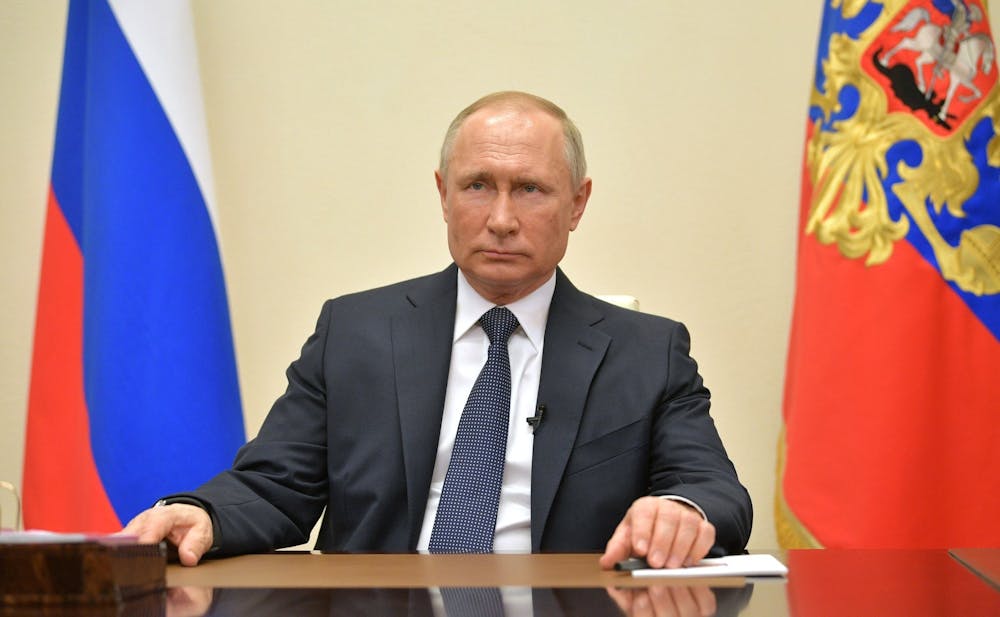The authoritarianism of Russian President Vladimir Putin has distinct features that both help and hinder his country, according to Russian political scientist Vladimir Gel’man.
At a Tuesday lecture event, Gel’man discussed long-term trends of Russia’s economic modernization as well as the recent arrest of dissident Alexei Navalny. Gel’man is a professor of political science at the European University at St. Petersburg, Russia, and Finland Distinguished Professor at the Aleksanteri Institute, University of Helsinki.
The talk comes in response to both constitutional changes last March that legally allowed Vladimir Putin to extend his term as president until 2036, as well as the recent arrest of Alexei Navalny. Navalny is well known for both his opposition to the Kremlin and his recent poisoning, which he blamed on the Kremlin while recovering in Germany.
Gel’man described Russia today as a personalist authoritarianism — the most common form of authoritarian governance — as opposed to monarchy or one party rule.
Russia had an authoritarian monarchy under the Romanov dynasty, from 1613-1917, then an authoritarian one-party rule under the Soviet Union until 1991. Gel’man identified the early 1990s as a period of democratization in Russia, before authoritarian trends once again emerged in the early 2000s.
“Putin has been the de facto leader since 2000,” Gel’man said. During this period, Putin served as both President and Prime Minister of Russia, alternating with Dmitri Medvedev, a close ally.
According to Gel’man, Russia’s major ongoing challenges include stagnant wages and the ever-present question of who will succeed Putin as president.
“Personalist autocracies have a low chance of dynastic succession,” Gel’man said. “In most cases, the dictator’s son does not become the next dictator. One recent exception is Azerbaijan, but that’s not the norm.”

Real income in Russia is similar in 2020 relative to 2010, but the Russian currency reserve has expanded substantially as a result of the COVID-19 pandemic.
“Modern authoritarian states seem to sacrifice high growth for political survival,” Gel’man said. He pointed to a 2018 study suggesting that even protracted recessions do not have a high impact on the survivability of a regime.
Gel’man also said that Russia’s relatively good GDP, high education level, and low ethno-religious conflict all help preserve stability. According to him, those same factors would actually help Russia function as a democracy.
“Any future transition will not be as dramatic as the Soviet collapse,” Gel’man said of the potential for a transition of power in Russia post-Putin. “The problems of state building have been addressed since then.”

Still, Gel’man said that Putin’s successor would not be universally popular. The experience of older generations who lived through the turbulent 1990s gives good reason for them to prefer Putin’s stability over radical change, he said. But he added that younger Russians do not entirely agree: “For younger generations, the ‘Good Soviet Union’ normative ideal fits poorly,” Gel’man explained.
Gel’man was pessimistic about potential improvement in Western-Russia relations. He said that an anti-Western attitude benefitted Russian lawmakers, and Russian foreign policy does not change quickly. Any reset in relations could only happen after Putin, or if the West was to abandon its current stance. Thus, the current “quasi-Cold War relationship” is likely here to stay.
Finally, Gel’man discussed Navalny’s impact as a politician and activist.
“He barely survived the poisoning,” Gel’man said. “There is no guarantee he will survive until the end of this year. Navalny has, however, built up a network of supporters nearly from scratch. He has nationwide recognition.”
Gel’man considered major political change in the immediate aftermath of Navalny’s arrest to be unlikely. He pointed to the 3.5 percent rule: if 3.5 percent of a country’s population protests, then the regime is over.
“In Russia, this would mean 4 million people taking to the streets, roughly a third of Moscow’s population,” Gel’man said. “As far as we know this has not occurred, not is it likely. But political science is notoriously bad with predictions.”
The lecture, titled “Challenges to Russian Authoritarianism: Is Putin Forever?,” was sponsored by the Program in Russian, East European, and Eurasian Studies, the Department of History, the Department of Slavic Languages and Literatures, and the Department of Music. The event was held virtually on Feb. 9, 2021.








